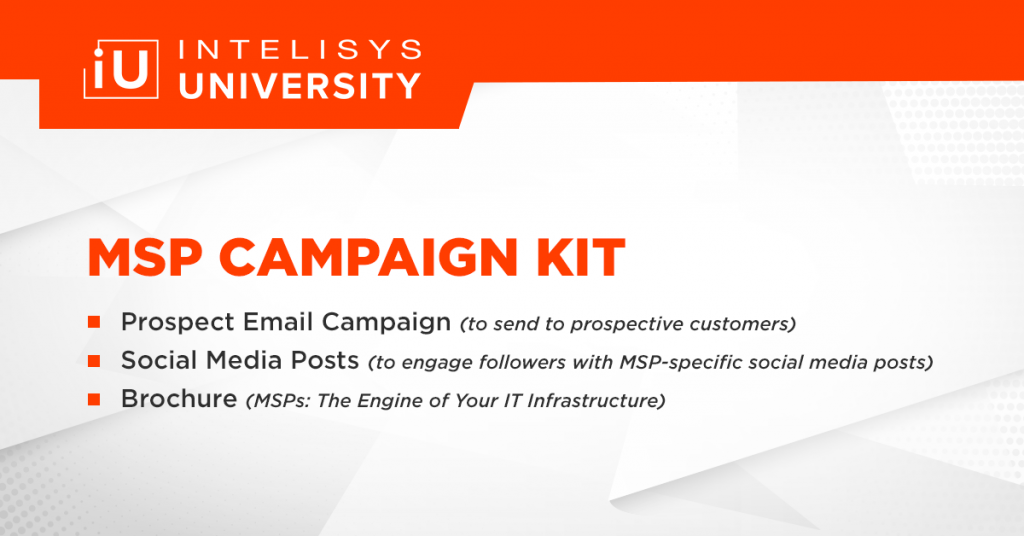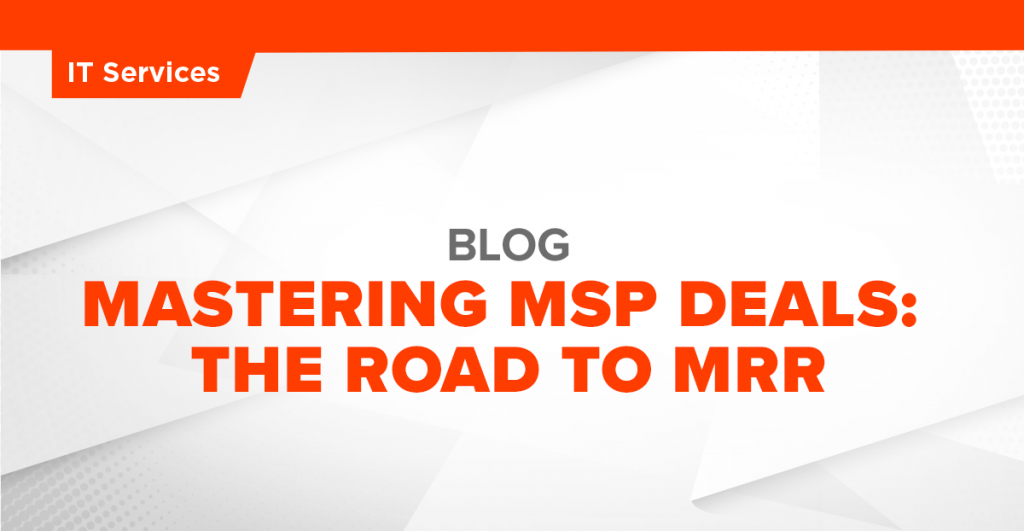
According to an informal survey we recently conducted during a webinar, only 20% of Intelisys Sales Partners are regularly selling Managed Service Providers (MSPs). That means 80% are missing out on one of the most lucrative product categories in the Intelisys portfolio.
The beauty of MSPs is that they can bring considerable MRR – even when the customer is a smaller business.
By mastering MSP deals, you can significantly raise your potential future earnings.
An introduction to MSPs
Let’s start with a basic definition. A Managed Service Provider (MSP) actively administrates a service and delivers support on an ongoing basis. It’s basically the opposite of a “plug-and-play” product. An MSP remains hands-on – hence the MRR for both the provider and the Sales Partner.
With an MSP, the administration can occur in a few different settings:
- On the customer’s premises
- In the MSP’s data center
- In a third-party data center
“MSP” is a general term, and it applies to a wide variety of solutions in the Intelisys portfolio. That’s why we’ll explain the different forms that an MSP solution can take – and help you identify opportunities for MSP deals with your customers.
Categories of MSP Solutions
There are multiple MSP solution sets that you can offer customers, including:
- Help Desk – This could include both on-site help desk support and remote help desk support or even staff augmentation.
- Endpoints – Along with desktops and servers, endpoint support could assist with deployment, configuration, and management of mobile phones, tablets, and even IoT devices.
- Systems – Windows deployment services, Active Directory services, and cloud services (Microsoft 365 management, for example) give Sales Partners a great entry point for MSP deals.
- Networking – This could involve physical deployment, configuration, management, and support for routers, switches, firewalls, wireless access points, and public internet carriers. This also includes low voltage cabling throughout a customer’s facilities.
- Applications – MSPs can handle a company’s support tickets for SaaS products like AutoCAD or Office 365.
- Cybersecurity – Lots of companies are switching to managed security service providers (MSSPs), which provide a full menu of traditional security solutions (including managed detection and response, security awareness training, email security gateways, and password management).
- Cloud Computing – An MSP can move a customer’s server environment into their private cloud (relieving the customer of the need to maintain a data center) or maintain systems in another provider’s private cloud.
- Support – An MSP can remain on stand-by for a customer’s admin team, ready to deploy new equipment, implement new applications, or troubleshoot issues when the need arises.
Managed services vs pro services
A traditional MSP is, by definition, a managed service. But many MSP deals also tie in pro services that your customers will find valuable. By combining managed services and pro services, you can simultaneously meet a wide variety of your customers’ needs.
Here are some of the pro services that often align with MSPs:
- Implementations – This could involve new software, new cybersecurity procedures, or even just new workflows.
- Migrations – MSPs can help a company move from one system to another (for example, from an on-premise system to a cloud-based system).
- App Dev – An MSP could develop an application as a pro service on the front end, and then continue to manage the application on the back end.
- Deployment – From applications to physical equipment, MSPs can help with establishing new workflows and lifecycle management.
- Low-Voltage Cabling – Even in the era of wifi and Bluetooth, physical cable connections are often optimal, and MSPs can help install them.
Cracking the Code: How to Land MSP Deals
To land MSP deals, you need to start by understanding your customers’ needs and preferences. Below, we’ll break down some specific points to consider.
Customers who want to outsource or replace their IT
MSPs are especially attractive for businesses that are shifting their IT infrastructure. For example, there’s a current trend in which companies use an MSP to escalate their help desk into a second or third tier. As a Sales Partner, you can identify companies that are eager to make these sorts of changes – and then pitch MSPs accordingly.
One MSP for everything vs multiple point solutions
As you work through MSP deals, you’ll find there’s a common choice that companies face: whether to use a single MSP in several areas or use multiple point solutions. For example, a single MSP could provide both managed Office 365 and Microsoft Licensing – at which point the customer has to decide whether they want the “two-in-one” solution, or if it would be better to get the managed Office 365 and the Microsoft Licensing from two different providers.
There are benefits and drawbacks to both options. An all-in-one solution simplifies workflows, while the point solutions give a company flexibility to work with specialists in various fields (and change providers more easily if a problem comes up).
As a Sales Partner, you can manage these conversations differently depending on the customer, basing your suggestions on their needs and preferences.
The presale process
Here’s the insider playbook for closing an MSP deal:
- Step 1: Understand the customer’s needs. Start out by gaining a full understanding of the company’s infrastructure, business model, and goals. Identify key stakeholders, and ask about their processes and workflows. You should also make note of any potential roadblocks – including stakeholders who could argue for rejection.
- Step 2: Know the path forward. During discovery calls, share what you’ve learned about the company and suggest a path forward. Then, you can build a supplier list, introduce suppliers, and schedule meetings. Be prepared for revisions to any tentative deals, especially around scope or pricing.
Get Focused on MSP Deals
MSP deals are lucrative for Sales Partners, giving you MRR that many other solutions don’t provide. Yes, these deals involve a larger sales cycle – but even smaller IT companies can end up spending a lot.
For support with MSP-related sales, reach out to your SE.
Learn more with Intelisys University
Check out the full recording of our webinar on this topic, available in Intelisys University Learning.
And take a look at the additional resources in Intelisys University. There, you’ll find a complete campaign kit of marketing materials – including a brandable brochure, email and social media campaign.

